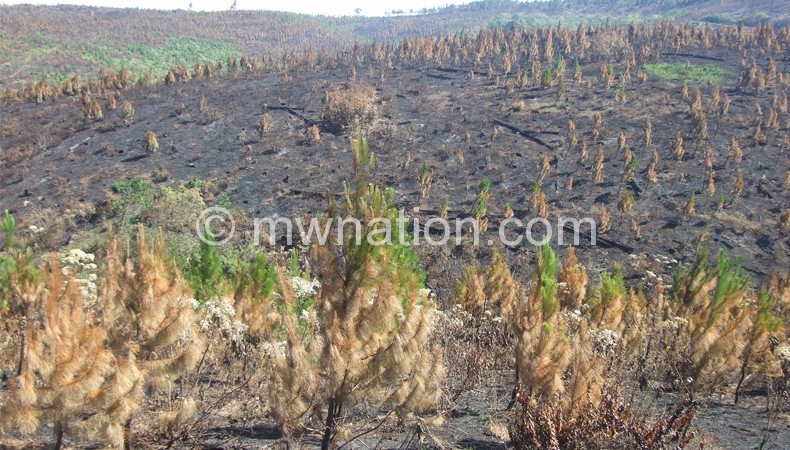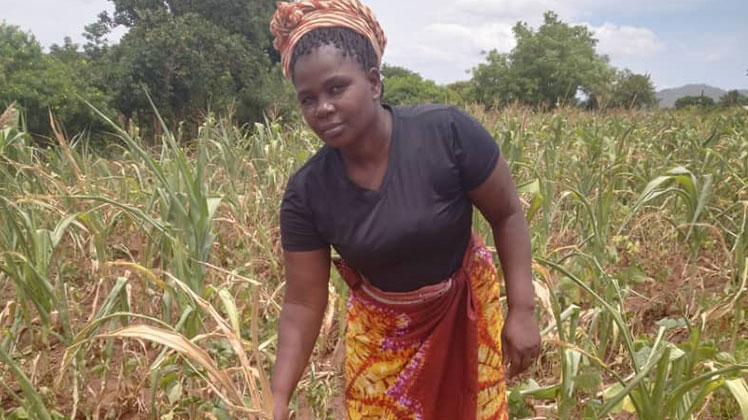Ending bushfires in Mwanza
For people of Mwanza District, the onset of the dry season is always cause for concern. It is during this season that bushfires rage, razing down natural resources and sometimes property.
Environmental district officer for Mwanza, Jarvis Mwenechanya, says bushfires in the district are fuelled by cultural practices that are harmful to the environment, such as lighting fires to clear their fields after harvesting.
 “The weather in Mwanza is usually very hot, and during dry season, with the cultivation of dambo areas in the district, fire spreads easily in these conditions. Other causes of bushfires are arsonists, charcoal burning and mice hunting,” says Mwenechanya.
“The weather in Mwanza is usually very hot, and during dry season, with the cultivation of dambo areas in the district, fire spreads easily in these conditions. Other causes of bushfires are arsonists, charcoal burning and mice hunting,” says Mwenechanya.
He says bushfires have cleared much of the vegetation in the district.
“The situation has worsened soil erosion as the land has been left bare, exposing it to effects of heavy rains. This has also led to increase in siltation of rivers in the district as a result of deforestation from bush fires,” he explains.
Kondwani Chidziwisano, a lecturer in environmental health at The Polytechnic, says open burning of bush has negative effects on both humans and the environment.
“Open burning releases different kinds of pollutants into the atmosphere, such as the particulate matter and volatile organic compounds such as polycyclic aromatic hydrocarbons [PAHs]. With time, the pollutants penetrate the earth and in the process, people get exposed through inhalation,” says Chidziwisano.
The most dangerous of the two, Chidziwisano says, is the particulate matter of the size five micrometre or less because it causes different respiratory problems such as chronic bronchitis, lung cancer and asthma.
“At greater risk are children, the elderly and people that are immune compromised. Women and children in rural areas are at greater risk because they get exposed to smoke as they cook with fuel wood. This mostly happens when we use traditional cook stoves that release heavy smoke which contains different kinds of pollutants, including PAHs,” Chidziwisano explains.
The risks are equally bad for the environment, as some of the compounds released into the atmosphere produce acid, resulting in acid rain.
“Acid rain causes acidification of lakes and streams and contributes to the damage of aquatic life such as fish because they cannot survive in very acidic conditions,” he says.
According to the environmental expert, most of the effects on forests are subtle, though acid deposition may influence forest vegetation and soils.
“Acid rain weakens the trees’ natural defences, making them more vulnerable to diseases and pests. It may also remove soil nutrients such as calcium and magnesium from soils in high elevation forests,” he says.
He further says high concentration of PM particles in the atmosphere from bushfires are a major contributor to haze which reduces visibility while global warming has negative effects on humans such as drought, increase in vector-borne diseases such as malaria. He adds that increased precipitation results in flooding.
But what can be done to curb this malpractice?
Chiziwisano suggests that communities need to be advised on the dangers of open burning with emphasis on its consequences to future generations, especially on global warming to safeguard the environment.
Not that the district council is sitting idle. According to Mwenechanya, says Mwanza District is doing several activities in an effort to reduce the problem of bushfires such as awareness campaigns, establishment of bushfire monitoring, control committees and introduction of bushfire management plans.
“We have also established bylaws to curtail bushfires which we believe will be effective as it is legally binding. Continuous awareness campaigns and environmental outreach programmes, establishing of more village forest areas and revamping of village natural resources committees are essential in controlling and management of bushfires as it is the greatest enemy to vegetation,” Mwenechanya explains.
Assistant forestry officer for Mwanza and lecturer at Malawi College of Forestry and Wildlife, Mary Chisale, says the Forestry Department, through the district forestry offices, are engaged in bushfire campaigns, controlled early burning and the making of firebreaks around forests to reduce this problem.
Trees and the natural environment have been destroyed due to bushfires in the country and there is also increased soil erosion due to land degradation since these fires leave the soil bare.
This is why Mwanza residents have vowed to plant more trees and work together with government in controlling bushfires. n





